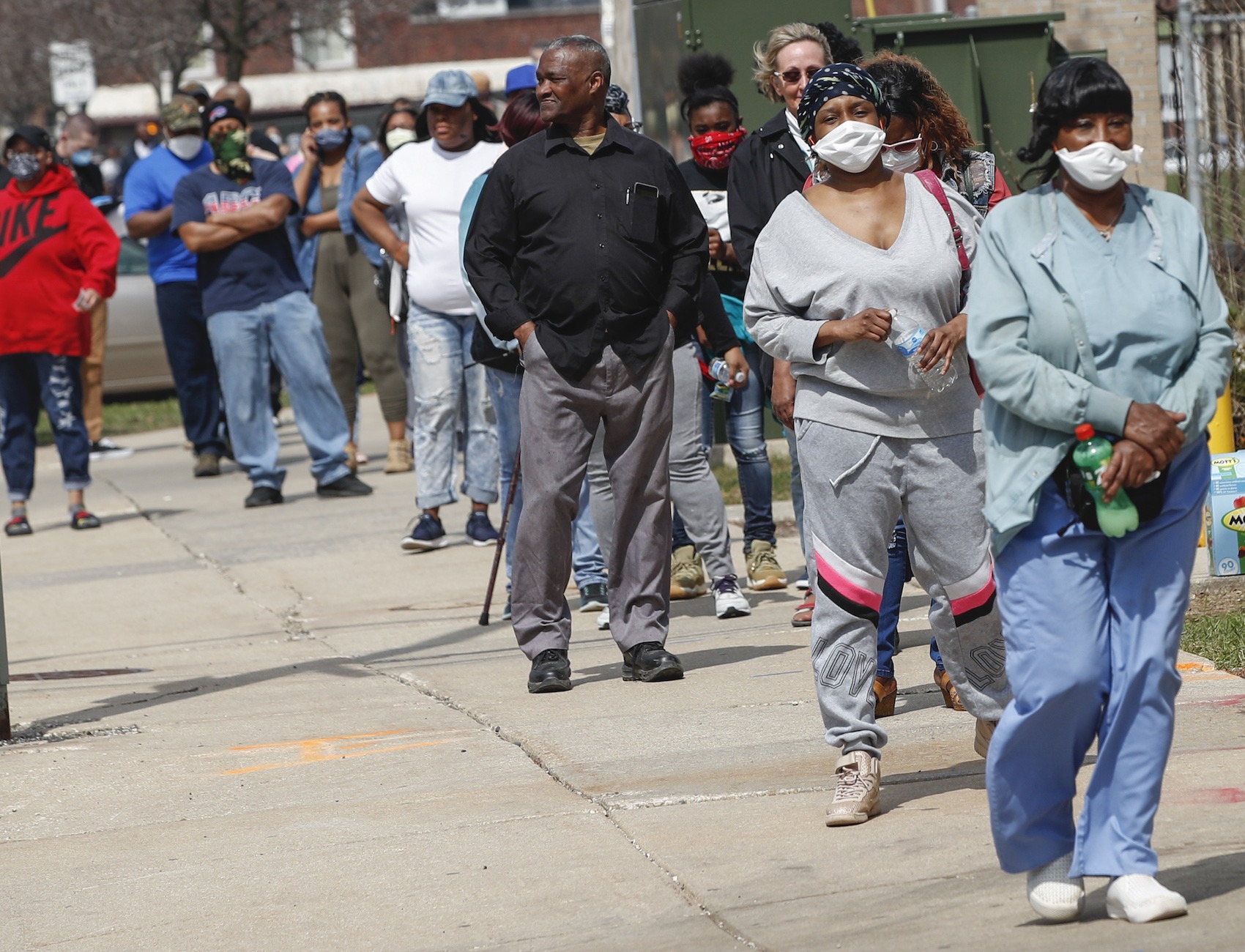Voting Rights Advocates Sound the Alarm About Disenfranchisement of Black Voters in Wisconsin’s Primary
‘We literally held an election during a pandemic.’

At four months pregnant, Milwaukee resident Jasmine Johnson is very concerned about what contracting the novel coronavirus could mean for the health of herself and her baby. She has been strictly following her state’s stay in place order and hasn’t left her home in almost one month.
So on Tuesday, Johnson, who is 30 and African American, chose not to risk the trip to a polling place to cast her ballot in the state’s primary. And due to a recent move, she and her husband missed the deadline to apply for an absentee ballot.
“I’ve never missed a vote,” she said. “It’s kind of ridiculous. You told me to stay inside. I don’t understand why they wouldn’t postpone it or make absentee ballots available to everyone.”
“If I weren’t pregnant I’d probably take the risk today with gloves and masks and all that,” she added. “But I just couldn’t do that today.”
Wisconsin’s Black residents, who are already disproportionately impacted by the state’s suppressive voter ID law and voter purges, have also been hit harder by the coronavirus. The state is 6.7 percent Black, but 40 percent of the people who have died from COVID-19 in Wisconsin have been Black residents of Milwaukee. Holding the election under these conditions constitutes further suppression of the Black vote, voting rights advocates say.
“No doubt, Milwaukee was ground zero for Black voters—many faced insurmountable obstacles,” Kristen Clarke, president and executive director of the Lawyers’ Committee for Civil Rights Under Law, told The Appeal in an email. “For many Black voters, they faced a choice of defying stay at home orders at a moment when they are subjected to higher COVID19 risk or running the risk of being disenfranchised. No voter should have to choose between their health and the sacred right to vote.”
Because of staffing shortages, Milwaukee consolidated its planned 180 polling locations into just five. The move left voters confused about where to go, forcing them to travel long distances on public transportation or walk miles to the nearest location.
The timing of Wisconsin’s primary has been the subject of intense controversy. Governor Tony Evers issued an emergency order on Monday pushing back the primary election until June. But the Republican-controlled legislature appealed the order to the Wisconsin Supreme Court, claiming not holding an election now would leave vacancies in critical seats. Within hours, the court ruled 4-2 to overturn the order, allowing the election to take place amid the COVID-19 pandemic.
Dakota Hall, executive director of Milwaukee-based nonprofit Leaders Igniting Transformation, said the main form of voter suppression he has heard about and witnessed across the state is voter confusion stemming from the various court decisions and orders cancelling and then rescheduling the election.
“We’ve seen at least five different changes in this election since Thursday,” he said.
Many voters also reported waiting in line for hours to cast a ballot. Hall said he observed a line at one polling place Tuesday morning that snaked around for roughly half a mile. He said many people weren’t wearing masks or other protective gear, and social distancing was not being practiced.
“We shouldn’t have had this election,” he said. “This election is truly going to be one for the history books. Though it probably will not be declared illegitimate, I think a lot of voters will probably declare it illegitimate because of the disenfranchisement. We literally held an election during a pandemic.”
Shavonda Sisson, the director of programming at Public Allies Milwaukee, took the day off work to coordinate a group of roughly 21 volunteers in Milwaukee and Madison that had, as of the middle of the afternoon, received 56 requests from people to have their ballots picked up. She said she wanted to lead this effort to make “a small dent in the number of folks that this process has disenfranchised.”
Many of the individuals the volunteers have helped are immunocompromised, have disabilities or underlying health conditions, and cannot risk going to a polling place to cast a ballot in person, she said.
She criticized the state’s officials, who she said should have been making election contingency plans for months, if not weeks.
Sisson herself was impacted by the state’s failure to send absentee ballots to everyone who requested them. She and her husband requested ballots on the same day, before the deadline, she said. “He received an envelope with no ballot inside,” she said. “I received nothing.”
As of early Tuesday morning, 9,388 voters had requested absentee ballots that had not yet been sent, according to the Wisconsin Election Commission.
Sisson also worries about people who can’t afford to stand in line for hours to cast a ballot.
“If you think about our essential workers, who are mostly hourly workers, who are working at our grocery stores and our pharmacies—they cannot afford, they cannot take the financial hit, to be able to wait in line for hours and hours,” she said.
As a result of the state’s failure to properly administer the election, the results will be extremely skewed and will not reflect the people of Wisconsin, she said.
“It’s not a real election,” she said. “How can you have a real election when your populace is not having access to vote?”
Correction: An earlier version of this article misstated the court that overturned Evers’s order.
